
Chaudhvin Ka Chand is a 1960 Indian Hindi-language film directed by Mohammed Sadiq.
Guru Dutt was an Indian film actor, director, producer, choreographer, and writer. He is regarded as one of the greatest filmmakers of Indian cinema.

Waheeda Rehman is an Indian actress. Regarded as one of Hindi cinema's most accomplished actresses, she has worked in more than 90 feature films, in a career spanning over five decades. Her accolades include a National Film Award and three Filmfare Awards. She was honoured with India's civilian awards; the Padma Shri in 1972 and the Padma Bhushan in 2011. In 2021 she was honoured with the Dadasaheb Phalke Award, India's highest award in the field of cinema, but was awarded in 2023.
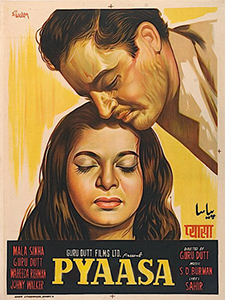
Pyaasa is a 1957 Indian Hindi drama film directed and produced by Guru Dutt, who stars alongside Mala Sinha, Waheeda Rehman, Rehman, and Johnny Walker. Set in Calcutta, it focuses on the disillusioned Urdu poet Vijay (Dutt), whose works are underestimated by publishers and panned for writing on social issues rather than romantic topics. The film follows his encounters with the golden-hearted prostitute Gulabo and his former girlfriend Meena (Sinha), how the former helps him to get his poetry published, the success of his works, and his romantic relationship with Gulabo.
Nasreen Munni Kabir is an India-born television producer, director and author based in the U.K. She is best known for producing an annual season of Indian films for the British terrestrial television channel Channel 4.

Sahib Bibi Aur Ghulam is a 1962 Indian Hindi-language drama film that was directed by Abrar Alvi and produced by Guru Dutt, who also co-stars in it alongside Meena Kumari, Rehman, and Waheeda Rehman. The film, which is based on Bimal Mitra's Bengali-language novel Saheb Bibi Golam (1953) which was the second adaptation of the novel after the 1956 Bengali film with the same title Saheb Bibi Golam starring Sumitra Devi, Uttam Kumar and Chhabi Biswas. Having seen the novel and its staged version, Dutt wanted to adapt Saheb Bibi Golam into a film, was set in the 19th century during the British Raj and focuses on Bhoothnath (Dutt), who meets Chhoti Bahu (Kumari), the lonely wife of a zamindar (Rehman). The film follows Chhoti Bahu's effort to keep her husband—who likes drinking and watching tawaifs perform—at their home by drinking with him. She becomes addicted to alcohol, leading both of them into bankruptcy.
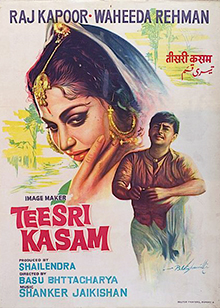
Teesri Kasam is a 1966 Hindi language drama film directed by Basu Bhattacharya and produced by lyricist Shailendra. It is based on the short story Mare Gaye Gulfam, by the Hindi novelist Phanishwarnath Renu. The film stars Raj Kapoor and Waheeda Rehman. The duo Shankar–Jaikishan composed the film's score. The film's cinematography was done by Subrata Mitra, dialogues were written by Phanishwarnath Renu and the screenplay is by Nabendu Ghosh.

Kaagaz Ke Phool is a 1959 Indian Hindi-language romantic drama film produced and directed by Guru Dutt, who also played the lead role in the film along with Waheeda Rehman. It is the first Indian film in CinemaScope and the last film officially directed by Dutt. It marked a technical revolution in Indian cinematography and is widely considered to be ahead of its time.

The Guru Dutt team was a group of filmmakers formed by Guru Dutt for some of his works. Some well-known films that the team created include Chaudhvin Ka Chand, Sahib Bibi Aur Ghulam, Kaagaz Ke Phool, and Pyaasa. In 2005 Pyaasa was ranked among the top 100 movies by Time magazine.
In Search of Guru Dutt is a 1989 three-part documentary film on the life and work of Indian actor, writer, director and producer of Hindi films Guru Dutt to mark his 25th death anniversary.

Rojulu Marayi is a 1955 Indian Telugu-language drama film directed by Tapi Chanakya. It stars Akkineni Nageswara Rao, Sowcar Janaki with music composed by Master Venu. The film was produced by C. V. R. Prasad on Sarathi Films banner.
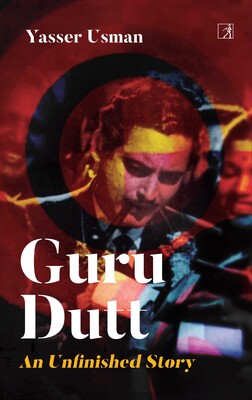
Guru Dutt: An Unfinished Story is a 2021 Indian biographical book written by Yasser Usman, chronicling the life and career of the Indian actor and filmmaker Guru Dutt. It describes Dutt's birth in Panambur in 1925, his 18-year-long film career, his marriage to the playback singer Geeta Dutt, with whom he had three children, and his death in 1964.

Ten Years with Guru Dutt is a biography of Indian filmmaker Guru Dutt that was written by journalist Sathya Saran. It is based on Saran's conversations with the screenwriter Abrar Alvi about Dutt and Alvi's collaborations, which began when they met on the sets of Baaz (1953) and ended with Dutt's death in 1964. This information was compiled into a 23-chapter book with first-person narrative interspersed with Saran's commentary. Penguin Group published Ten Years with Guru Dutt on 25 July 2008.

In the Company of a Poet is a 2012 book by the author and television documentary producer Nasreen Munni Kabir, containing her interview with Gulzar. It details his early life, including his birth in 1934 in Dina, British India, and his Sikh family background, his film and poetic career, and his marriage to the actress Rakhee in 1973, with whom he has a daughter, Meghna. In the Company of a Poet was published by Rupa Publications on 12 November 2012 and received mixed reviews from critics. Firstpost included the book in its listing of Top 10 in Indian Non-fiction Books.

Yours Guru Dutt is a 2006 book by the British author and television documentary producer Nasreen Munni Kabir, containing a total of 37 handwritten letters in both English and Hindi by the Indian actor and filmmaker Guru Dutt—most of which are addressed to his wife Geeta. The book, published by Roli Books and became Kabir's second book about Dutt after Guru Dutt: A Life in Cinema (1996), was commercially successful. It garnered positive critical acclaim, with some reviewers noting the elegance in his letters.

Guru Dutt: A Life in Cinema is a 1996 biography written by the British author and television documentary producer Nasreen Munni Kabir, detailing the life and career of the Indian actor-cum-filmmaker Guru Dutt. The book chronicles Dutt's birth in Panambur in 1925, his 18-year-long film career, his marriage to the playback singer Geeta Dutt, with whom he had three children, and his death in 1964.
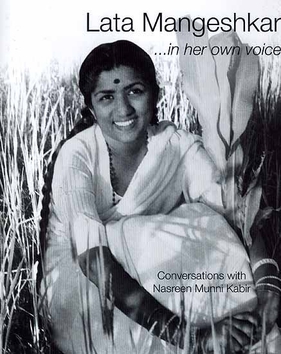
Lata Mangeshkar ...in Her Own Voice is a biography by the British author and television documentary producer Nasreen Munni Kabir, detailing the life and career of the Indian playback singer Lata Mangeshkar. The book contains their extensive conversations from May 2008 to March 2009. Published by Niyogi Books on. 15 May 2009, it was well received by literary critics.
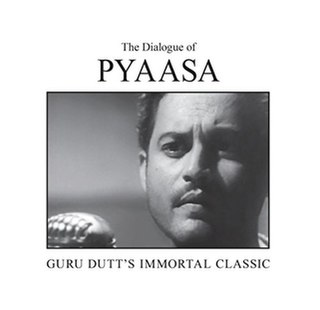
The Dialogue of Pyaasa is a 2011 book by the British author and television documentary producer Nasreen Munni Kabir, containing the dialogues of the 1957 Indian romantic drama Pyaasa in Hindustani and its translation in English. The book was published by Om Books International on 28 February 2011 and received positive critical reviews.

Jiya Jale: The Stories of Songs is a book by the author and television documentary producer Nasreen Munni Kabir, containing her conversations with Gulzar taking place from early 2017 to April 2018. Her second book on the same subject after In the Company of a Poet in 2012, it details the development of several of his songs and features their English translations. The book was published by Speaking Tiger Books on 10 November 2018 and acclaimed by critics for its contents and format.
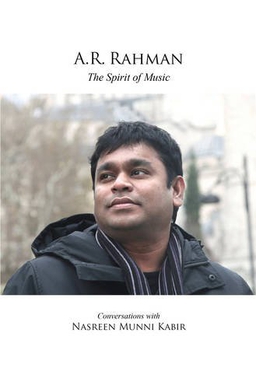
A. R. Rahman: The Spirit of Music is a biographical book by the author and television documentary producer Nasreen Munni Kabir, containing her extensive conversations with the composer A. R. Rahman on the latter's life and career. It describes his birth in Madras in 1967, his 29-year-long musical career, and his marriage in 1995 to Saira Banu, with whom he has three children. The book was published by Om Books International on 29 March 2011 and declared as a commercial success.

















